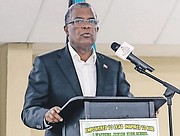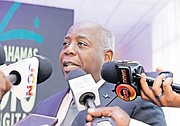By MALCOLM STRACHAN
ON September 16, 2021, The Bahamas voted in the current administration – meaning we have now had a little over a year of the PLP government.
If you’ve been on social media, you may well have seen plenty of PLP posts about how successful a year it has been – but you’d expect them to say that. But has the government been a success so far?
A year is still in many ways quite early in the life of a government – but it is certainly a moment to make an assessment and see the direction we’re going in. But how do we make such an assessment?

Well, for starters, let’s look at their own assessment for what makes them a success. Earlier this month, PLP chairman Fred Mitchell cited his own list of achievements by the PLP.
His first declaration of success was the removal of the COVID-19 Emergency Powers Orders. He said: “People are free to travel where they want to go and to try and get their families and lives back together and there’s a semblance of a renewed order in the country. I think that’s the first accomplishment…”
While the orders have been lifted, in similar fashion to countries around the world, COVID is still with us. That’s not a criticism of the PLP administration – we’re simply experiencing the pandemic the same as the rest of the world. Vaccinations don’t seem to have experienced much of an uplift, and government seems to avoid talking about the virus rather than encouraging people to take measures such as vaccination to fight it. But if your measure of success is simply there not being orders in place, then yes, that’s changed. Whether that’s put people more at risk doesn’t seem to be a factor in Mr Mitchell’s conversation.
Next up, he praised the reduction of VAT. He said: “The VAT was reduced as we promised.”
Well… sort of. VAT was indeed reduced to ten percent – and that was indeed a promise. But no mention was made at the time of adding it back on to breadbasket items. So your view of whether that is an achievement or not is down to your view of how important it is to have VAT-free essential items.
What next? Well, Mr Mitchell cited a housing programme being “off to a start” but we’ve seen limited impact of that so far. Again, with it only being a year into the government, perhaps that’s not too surprising.
He also spoke of efforts to help Dorian victims, saying “it’s taken much too long to get people back on their feet”. It has indeed – and that hasn’t been helped in this past week or two with the sight of the dome shelters being demolished, with one resident saying he watched his belongings destroyed in the process and being left with nowhere to live. He said it was “like Dorian all over again”.
What about the social programmes to help people? The much-touted RISE programme to assist people in need still hasn’t been launched – and won’t be until next month, Social Services Minister Obie Wilchcombe said on Friday. He announced the plan in July – it was supposed to help people in need because of increased prices, inflation and an insufficient minimum wage. One of those price factors is the added VAT on breadbasket items the PLP themselves imposed.
Earlier this month, financial expert and Fidelity Bank (Bahamas) chief executive Gowon Bowe, criticised the government for that delay. He said: “When VAT was reintroduced on a broader base, really the persons most severely impacted that needed those benefits have effectively been penalised for the better part of nine months because the cost of items went up for them but the needed assistance has not been implemented.”
He added: “Maybe they could have been forgiven for a month, maybe a quarter, but now it’s three quarters… you cannot dismiss the cries of people in need.”
Last month, Mr Mitchell also listed other items that are achievements of this administration, including settling long outstanding labour contracts for the public service. There does indeed seem to have been progress in resolving disputes with workers, and long overdue deals particularly with teachers and nurses have been resolved. Credit where it is due, and those employees particularly will be pleased to have such matters dealt with.
More thornily, Mr Mitchell said: “Fixing the economy of Grand Bahama is a big deal.”
It is indeed a big deal – but it’s far from clear that this has been done. In the past week, the deadline for due diligence by the Grand Lucayan buyer ran out, even with an extension that had been granted.
There is still a completion date on that deal – but there has been nervousness in the past week or two, with Deputy Prime Minister suggesting public discussion of the negotiations was not helpful. You can bet if everything was going fine, every PLP would be singing it from the rooftops.
If that deal goes through, great, job well done by all involved – but if it falters, that’s a major blow for the administration.
As for the rest of the Grand Bahama economy, Mr Mitchell is certainly overstating matters by suggesting fixing it is an achievement in the government’s first year. It’s not there yet.
What else is there? Well, we have a Police Commissioner who suggested the country would not pass the 100 mark in murders for the year, and we’re almost there before the end of September. If he is that wildly out on this prediction, it makes one wonder about the accuracy of his other statements.
Freedom of Information is so bad we can’t even get a date on when Freedom of Information will be implemented.
We still don’t know which Parliamentarians met the deadline for declarations as required by law – and which did not and any penalty they might face.
We still don’t know what contracts were awarded by the new government as they busily try to change the legislation that requires them to do so.
And we still don’t have legislation in place regarding such matters as marital rape, marijuana, citizenship and more, despite the government having a huge majority in Parliament to vote on such issues.

So, a year in, where are we? Frankly, it’s too soon to tell. There are good signs, such as Prime Minister Philip “Brave” Davis being on the forward foot internationally with regard to climate change and opening up the prospect of more revenue through carbon credits, as well as the economy continuing to recover from the pandemic – but there are also some of the same old issues, such as lack of information and transparency, and surprisingly few items of major legislation passed so far.
It is, of course, over the entirety of an administration’s term that they should be judged – but so far it’s neither a resounding success, nor a resounding failure.
A lot hinges on this Grand Lucayan deal, though - it’s a big one to watch. Keep a close on what is happening there.


